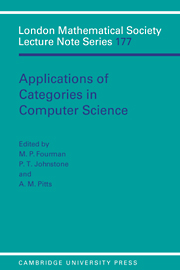 Applications of Categories in Computer Science
Applications of Categories in Computer Science Book contents
- Frontmatter
- Contents
- Preface
- Miscellaneous Frontmatter
- Computational comonads and intensional semantics
- Weakly distributive categories
- Sequentiality and full abstraction
- Remarks on algebraically compact categories
- Dinaturality for free
- Simply typed and untyped lambda calculus revisited
- Modelling reduction in confluent categories
- On clubs and data-type constructors
- Penrose diagrams and 2-dimensional rewriting
- Strong monads, algebras and fixed points
- Semantics of local variables
- Using fibrations to understand subtypes
- Reasoning about sequential functions via logical relations
- I-categories and duality
- Geometric theories and databases
- Partial products, bagdomains and hyperlocal toposes
Preface
Published online by Cambridge University Press: 24 September 2009
- Frontmatter
- Contents
- Preface
- Miscellaneous Frontmatter
- Computational comonads and intensional semantics
- Weakly distributive categories
- Sequentiality and full abstraction
- Remarks on algebraically compact categories
- Dinaturality for free
- Simply typed and untyped lambda calculus revisited
- Modelling reduction in confluent categories
- On clubs and data-type constructors
- Penrose diagrams and 2-dimensional rewriting
- Strong monads, algebras and fixed points
- Semantics of local variables
- Using fibrations to understand subtypes
- Reasoning about sequential functions via logical relations
- I-categories and duality
- Geometric theories and databases
- Partial products, bagdomains and hyperlocal toposes
Summary
The London Mathematical Society Symposium on Applications of Categories in Computer Science took place in the Department of Mathematical Sciences at the University of Durham from 20 to 30 July 1991. Although the interaction between the mathematical theory of categories and theoretical computer science is by no means a recent phenomenon, the last few years have seen a marked upsurge in activity in this area. Consequently this was a very wellattended and lively Symposium. There were 100 participants, 73 receiving partial financial support from the Science and Engineering Research Council. The scientific aspects of the meeting were organized by Michael Fourman (Edinburgh), Peter Johnstone (Cambridge) and Andrew Pitts (Cambridge). A programme committee consisting of the three organizers together with Samson Abramsky (Imperial College), Pierre-Louis Curien (ENS, Paris) and Glynn Winskel (Aarhus) decided the final details of the scientific programme. There were 62 talks, eight of which were by the four key speakers who were Pierre-Louis Curien, Peter Freyd (Pennsylvania), John Reynolds (Carnegie-Mellon) and Glynn Winskel.
The papers in this volume represent final versions of a selection of the material presented at the Symposium, or in one case (the paper which stands last in the volume) of a development arising out of discussions which took place at the Symposium. We hope that they collectively present a balanced overview of the current state of research on the intersection between categories and computer science. All the papers have been refereed; we regret that pressure of space obliged us toexclude one or two papers that received favourable referee's reports.
- Type
- Chapter
- Information
- Applications of Categories in Computer ScienceProceedings of the London Mathematical Society Symposium, Durham 1991, pp. viiPublisher: Cambridge University PressPrint publication year: 1992
